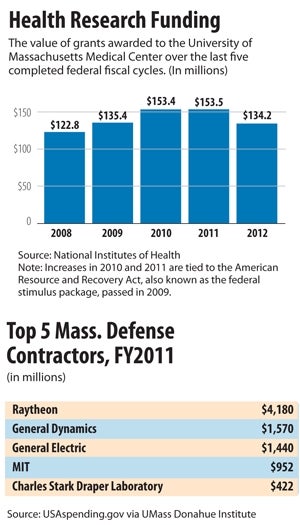With President Obama having secured a second term, the attention now pivots in the direction of the “fiscal cliff” and how close our political leaders will come to its edge before making the necessary compromises on taxes and federal spending, as well as raising the country’s debt ceiling without slowing down a creaky economic recovery.
To be sure, any changes in federal fiscal policy will have an impact on business. But the potential accompanying drama — which we hope is minimal, if at all — could very well impact our region in two key areas:
Federal funding of health research. The Worcester area has received, on average, about $160 million in health research money from the National Institutes of Health (NIH) in each of the last five federal fiscal cycles, led by the University of Massachusetts Medical Center. It received more than $135 million in fiscal 2009, then saw that rise to more than $153 million two years later thanks to federal stimulus money, before it dropped back to $134 million in fiscal 2012.
For UMass, forced cuts to its NIH funding stream could come at an extremely inopportune time with the impending debut of the $400-million Albert Sherman Center, much of which is dedicated to medical research in such areas as RNA biology, gene therapy and gene research.
Defense spending. Massachusetts has long been a chief beneficiary of Pentagon spending since World War II. But with the pressure to rein in spending, the end of military involvement in Iraq and the impending drawdown of activity in Afghanistan, defense contracts to the Bay State could very well take a large hit. After reaching a peak of $15.5 billion in fiscal year 2009, the total value of defense contracts to Massachusetts companies and organizations fell back to $13.9 billion in fiscal 2011.
In a report earlier this year, the Political Economy Research Institute at the University of Massachusetts-Amherst listed up to $44 billion in potential cuts for the current fiscal year, about $1.3 billion of which could impact Massachusetts contractors and the jobs tied to them, assuming the cuts are made in the same proportion of all defense spending awarded to the state in recent years.
Obama and the next Congress face a delicate balancing act, and last week’s election didn’t yield much change in terms of the political makeup in Washington: Did the message of the need to compromise, sent by many prominent business leaders in the closing weeks of the election, get across to our newly elected leaders? The primary task of government on the fiscal side is to keep the economic engine moving forward without inflicting undue harm from tax hikes and spending cuts. If the nation is to truly move forward, it needs to back away from the cliff, and ensure a fair flow of defense and medical research dollars as necessary investments to keep the country and economy strong.
Read more
Education, Training Keys To Mass. Manufacturing Future
Editorial: Change At Worcester Chamber
Editorial: Biggest Benefit Of CSX Deal Is Freight Transportation
Election Winners Must Reduce Uncertainty For Small Businesses

